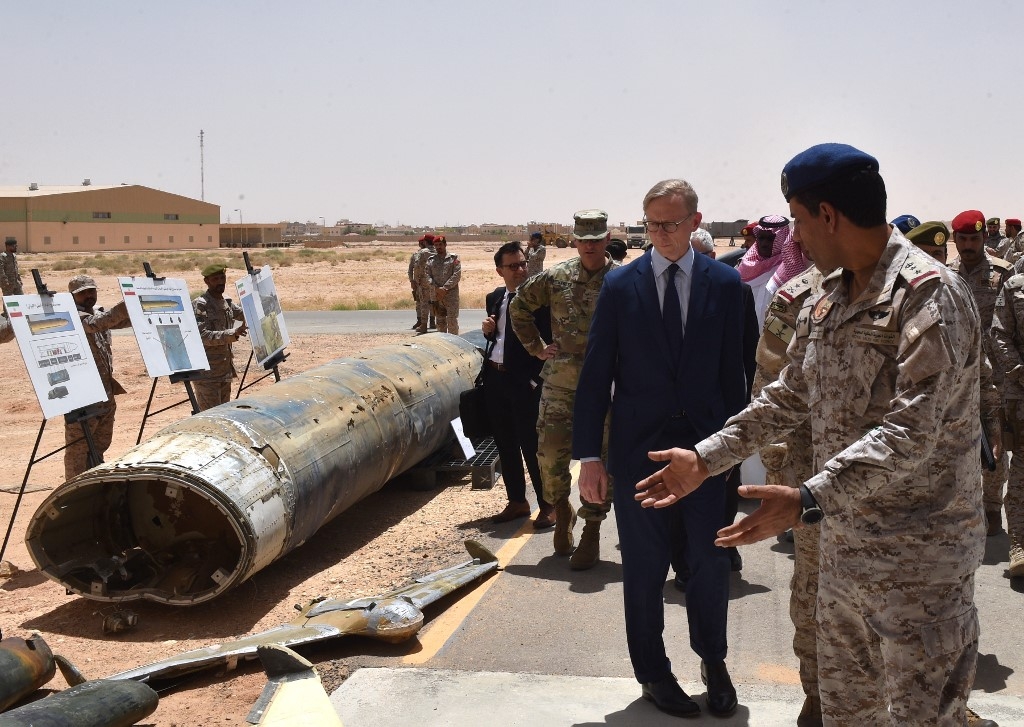US warns of possible Houthi missile strikes on Saudi capital

US officials warned of possible Houthi missile strikes on Saudi Arabia's capital, Riyadh, after the kingdom reported it intercepted several armed drones and missiles fired by the rebel group in Yemen.
The United States embassy in Riyadh on Wednesday warned American citizens in the capital to stay "alert" and "take necessary precautions".
Stay informed with MEE's newsletters
Sign up to get the latest alerts, insights and analysis, starting with Turkey Unpacked
"The embassy is tracking reports of possible missiles or drones that may be headed toward Riyadh today," the embassy said in a statement on its website.
On Thursday the embassy further confirmed the attempted attacks, saying they were "launched indiscriminately towards Riyadh, and risked the lives of innocent civilians, including Americans".
The Iran-linked Houthi rebels have stepped up attacks on neighbouring Saudi Arabia in recent weeks, mainly targeting southern provinces along their shared border.
The Houthis have targeted Riyadh in the past with missiles and drones, with the coalition claiming to have intercepted most of them. Riyadh lies more than 435 miles north of the border with Yemen.
'Deliberately target civilians'
Hours after the embassy statement, the coalition said six bomb-laden drones launched by the rebels towards the kingdom had been intercepted, according to the official Saudi Press Agency (SPA).
It did not specify the target, but coalition spokesman Turki al-Maliki said the drones were launched "deliberately and systematically to target civilians" in the kingdom, AFP reported.
The coalition also subsequently intercepted rebel ballistic missiles targeting the southern provinces of Jizan, Najran, as well as the southern city of Khamis Mushait, state television said.
Two other targets were destroyed in the air, it added.
Yemen is mired in civil war between the Houthi rebels, who control the capital, Sanaa, and a beleaguered internationally recognised government supported by the Saudi-led coalition.
The attacks come amid intense fighting in recent months as the Houthis try to seize control of oil-rich Marib province - the government's last northern stronghold, which lies 75 miles east of Sanaa.
The Saudi coalition in Yemen
Saudi Arabia has repeatedly accused Iran of supplying sophisticated weapons to the Houthis, a charge Tehran denies.
At the same time, the bulk of the conflict has begun to shift more towards an escalating economic battle that has further deepened the suffering of many Yemenis.
The Saudi coalition, which is backed by Western powers including the US, intervened in support of the Yemeni government in 2015 after the Houthis seized Sanaa - but it has struggled to oust the militia.
Tens of thousands of people, mostly civilians, have been killed and millions displaced in what the United Nations has called the world's worst humanitarian disaster.
US lawmakers have repeatedly passed bipartisan legislation seeking to end US support for the Saudi-led coalition, but President Donald Trump has refused to allow it. In 2019, Trump vetoed a bill to block his administration's "emergency" $8bn arms sale to the coalition.
On Tuesday, a UN report warned that the drivers of malnutrition in Yemen had intensified this year, as the coronavirus pandemic, economic decline, floods, escalating conflict and significant underfunding of aid have compounded the already bleak situation.
"If the war doesn't end now, we are nearing an irreversible situation and risk losing an entire generation of Yemen's young children," said Lise Grande, UN humanitarian coordinator for Yemen.
Middle East Eye delivers independent and unrivalled coverage and analysis of the Middle East, North Africa and beyond. To learn more about republishing this content and the associated fees, please fill out this form. More about MEE can be found here.






